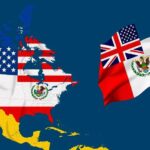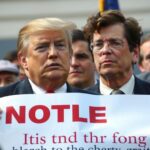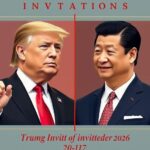Politics
AMERICA FIRST, ANDY KIM, ANNA KELLY, ASIA, ASIA SOCIETY POLICY INSTITUTE, BIDEN ADMINISTRATION, BROOKINGS INSTITUTION, CHINA, CNN, DONALD TRUMP, ELON MUSK, GEOPOLITICS, GEORGE INGRAM, INTERNATIONAL RELATIONS, MEXICO, NATIONAL SECURITY, NEW JERSEY, NORTH AMERICA, US, US AGENCY FOR INTERNATIONAL DEVELOPMENT
Nia Simpson
Trump’s Plan to Dismantle USAID Seen as Opportunity for China
President Trump’s efforts to dismantle USAID, claiming it as wasteful, may inadvertently benefit China by vacating U.S. influence in the developing world. Experts caution that reduced American aid will leave many humanitarian programs vulnerable, allowing China to strengthen its geopolitical ties through its investment initiatives, especially in the Global South.
President Donald Trump is actively pursuing the dismantling of the U.S. Agency for International Development (USAID), viewing it as a financial waste driven by ineffective leadership. This initiative has raised alarms among experts, who argue that it significantly benefits China at a time when American global influence is critical. With plans to drastically reduce USAID’s workforce, key humanitarian programs face jeopardy, potentially creating a leadership void that China could exploit to expand its influence in developing nations.
On his initial day in office, President Trump initiated a freeze on foreign aid, symbolizing a broader retreat from international engagement. Elon Musk, who leads efforts for government reform in Trump’s administration, has remarked on the aggressive dismantling of USAID. Experts indicate that a reduction in U.S. aid jeopardizes ongoing health and food security initiatives, with immediate repercussions for global humanitarian efforts.
Critics, including Senator Andy Kim from New Jersey, warn that America’s withdrawal from its leading role in international aid would further empower competitors like China. They argue that USAID, founded to counter Soviet influence in the 1960s, has been vital for maintaining U.S. presence and stability in many regions, serving both humanitarian and national interests.
Former USAID officials emphasize that American aid helps create markets for U.S. exports and fosters stability in countries, mitigating migration pressures and potential conflicts. The dismantling of USAID raises concerns over a power vacuum that could enhance China’s position, as the country seeks to elevate its status as a leader in the Global South by offering investment and development projects through its Belt and Road Initiative.
While criticisms have emerged regarding China’s development assistance model—predominantly characterized by loans rather than direct aid—experts underline the potential reputational advantages China could gain. As America withdraws, China is poised to emerge as a reliable partner, strengthening its geopolitical ties and credentials in clean energy.
However, defenders of dismantling USAID argue that the agency’s focus on ideology over practicality has diminished its credibility. Max Primorac, a senior scholar at the Heritage Foundation, contends that USAID’s policies inadvertently foster dependence on China, contradicting perceptions that its dismantlement favors Chinese interests. As proceedings unfold, the fate of remaining USAID programs remains uncertain, heightening fears regarding the longstanding trust in U.S. leadership.
Ultimately, experts suggest that Trump’s aggressive reshaping of foreign aid could bolster rivals like China far more than it contains their influence. The decision to dismantle such an influential agency, they contend, has the potential for far-reaching consequences, shifting the global landscape in favor of U.S. adversaries.
The U.S. Agency for International Development (USAID) has been a significant player in global humanitarian and development efforts since its inception in 1961. Created under President John F. Kennedy, its primary mission has been to promote social and economic growth, which indirectly serves U.S. national interests through market development and stability in foreign nations. Under the current administration, a shift towards an ‘America First’ policy is questioning the value and efficacy of USAID while reshaping America’s role in global affairs, particularly its competition with China for influence in the developing world.
In conclusion, the dismantling of USAID, as advocated by President Trump, raises significant concerns regarding its implications for American influence globally, particularly in light of China’s growing presence in the same arenas. Experts warn that this retreat may inadvertently empower China, allowing it to establish itself as a primary partner for many developing nations. The potential consequences of this policy shift could drastically reshape international relations and the dynamics of global aid.
Original Source: www.cnn.com








Post Comment